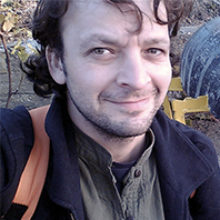Membership Q&A
Issue: Imaging
13 February 2018 article

This is a regular column to introduce our members. In this issue, we’re pleased to introduce Agah Ince.
Where are you currently based?
My main research and R&D station is in Acıbadem University, which is a relatively young thematic medical university in the heart of Istanbul, Turkey. I am a research scientist focusing on R&D initiatives on interdisciplinary Applied Microbiology projects. I am also responsible for international relations.
What is your area of specialism?
Microbial diagnostics and virology. I am currently focusing on synthetic biology and epigenetics.
And more specifically?
I am interested in developing simplistic, sensitive, on-site diagnostic tools and applications for using in the rapid diagnosis of diseases/pathogens. I can define myself as a cell/vector-farmer.
Tell us about your education to date.
I obtained my bachelor’s in Biology and Science Education, and my master’s in Cell Biology from Ondokuz Mayıs University in Samsun, Turkey. I then received a first PhD in Microbiology from the Karadeniz Tech University in Trabzon. This was followed by postdoctoral research at Wageningen University, Netherlands. I also have a second PhD degree in Virology/Biochemistry. I try to keep myself on the applied part of science as much as I can, so I had my sabbatical at the United Nations on the control of vector-borne disease agents. I am also directly involved in R&D infrastructure. I am a founder of two biotech companies active in medical diagnostics and work closely with related local industrial companies.
Where did your interest in microbiology come from?
From my grandmother who taught me how to make yoghurt, cheese and grape products. When I went to university I realised that I had learnt a lot of basic biology while living with her on the farm surrounded by nature in Arhavi (northeastern Turkey).
What are the professional challenges that present themselves, and how do you try to overcome them?
I observe various forms of discrimination (gender, age, nationality, race) in the scientific community. My personal opinion is that discrimination is sometimes unfairly used by people to gain control. Structuring an interdisciplinary and socially active team is challenging. To overcome these obstacles, I share my feelings and experiences with my colleagues and students, by accepting the risks and by continuing doing my work as decently as possible.
What is the best part about ‘doing science’?
It is possible to create your own freedom and then help other people to reach their dreams. I also like the artistic part of science: the beautiful microscopic images, and the fact that you can understand mechanisms that can be used in an applied way, such as training cells to attack pathogens or misbehaving cells (cancer).
Who is your role model?
Mustafa Kemal Atatürk, because of how he was an interdisciplinary person combining: being an army officer; revolutionary statesman; writer (including the first geometry book in Turkish in which he defined all the fundamental mathematical and geometrical terms, and provided examples of basic axioms and theorems); and the first President of Turkey. He used scientific norms as a base in his management during a time in which dictatorship was in fashion. I think science and research would benefit from such a revolutionary mind nowadays.
What do you do to relax?
Swimming, playing squash, computer games, and brainstorming with people from different backgrounds. I also prefer to go into nature to find food by fishing or hunting.
What one record and luxury item would you take to a desert island?
Sufi music. Calm spiritual music with traditional instruments, such as the Ney. A water-resistant photo album that includes all of my loved ones.
Tell us one thing that your work colleagues won’t know about you.
That I have already found out how one virus can be infected by another virus. But seriously: my opinion about most conventional education systems, which are rudimentary and lack the power to give people self-confidence and vision for the future.
If you weren’t a scientist, what would you be?
Being an astronaut was always my fantasy when I was a kid. I always wondered about the universe. But this is still in science. Outside science, I would be a good househusband, to help raise kids and take care of my family while running a farm.
